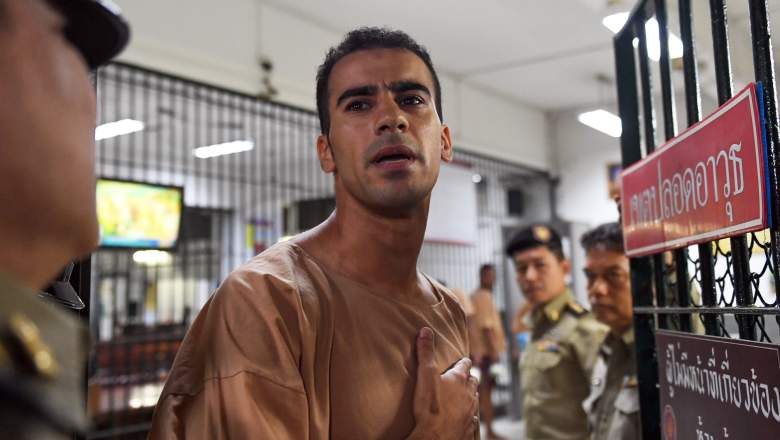
Getty Hakeem al-Araibi is escorted to a courtroom in Bangkok on February 4, 2019.
Hakeem al-Araibi is the Bahraini soccer player who was freed from Klong Prem Remand Prison in Bangkok, Thailand on February 11, 2019, after Bahrain withdrew an extradition request sentencing him in absentia to 10 years for vandalizing a police station.
His imprisonment drew worldwide humanitarian attention. Star soccer players, including Didier Drogba and Jamie Vardy, the Australian government, soccer’s international governing body FIFA, and the International Olympic Committee all lobbied Thailand for his release, reports BBC.
Here’s what you need to know:
1. Al-Araibi Was Arrested En Route to His Honeymoon
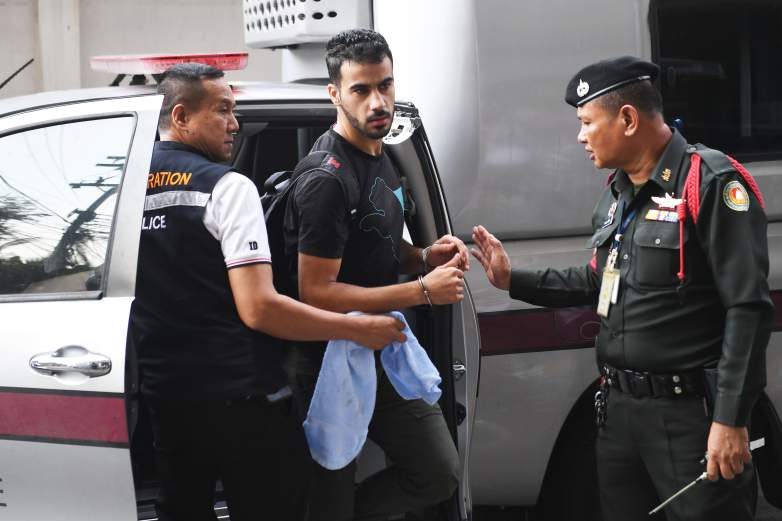
Hakeem al-Araibi Arrest is escorted by immigration police to a court in Bangkok, Thailand on December 11, 2018.
Al-Araibi had been living as a refugee in Australia when, on November 27, 2018, he and his wife were detained in Bangkok when they arrived for a belated honeymoon. It was al-Araibi’s first time traveling outside of Australia since he was granted refugee status five years ago. Interpol had, however, erroneously issued a red notice in contravention of international law protecting refugees against refoulement. Until his release on February 11, Bahrain demanded his extradition over a vandalism charge that al-Araibi strongly denies. Controversy still looms as to why Thailand held al-Araibi so long, and how Bahrain circumvented the refugee protection to issue extradition through Interpol in the first place.
Al-Araibi’s wife voluntarily spent the first two weeks of his detainment in a cell with him. “I know my husband, and he did nothing wrong. He is being punished for speaking out against abuses in Bahrain and I am devastated at what will happen if he is not freed to return to Australia. I can’t sleep, can’t breathe, knowing what awaits him,” she told The Guardian.
During the remainder of his detainment, al-Araibi’s wife returned to Melbourne after his arrest. She is preparing to start a degree in business. Upon al-Araibi’s release Chatchom Akapin, director-general of the international affairs department of Thailand’s Attorney-General’s office, said “My thoughts are with Hakeem’s wife. Her nightmare will shortly be at an end,” reports The Australian.
2. Al-Araibi Spoke Out Against Torture During the Arab Spring
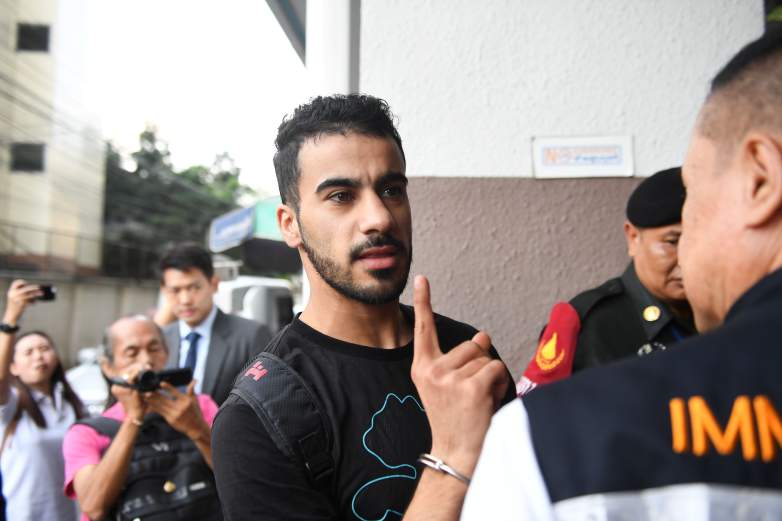
Hakeem al-Araibi Arrest in Bangkok on December 11, 2018.
In 2012, al-Araibi was accused of torching a police station during the Shi’ite-led protests demanding an elected prime minister in the small kingdom of Bahrain, a US ally. This waves of protests were crushed by security forces.
Al-Araibi accused Sheikh Salman bin Ebrahim al-Khalifa, President of the Asian Football Confederation since 2013, of heading a committee to persecute football players who protested the government during The Bahraini uprising of 2011 during his time as head of the Bahrain Football Association.
“Al-Araibi believes it was this public denunciation of the regime and in particular Sheikh Salman that motivated his Bangkok arrest” reports The Guardian. During his detention Thailand, Bahrain would not answer questions but instead issued press releases defending their judicial system.
3. Al-Araibi Used A Football Match to Flee For Asylum
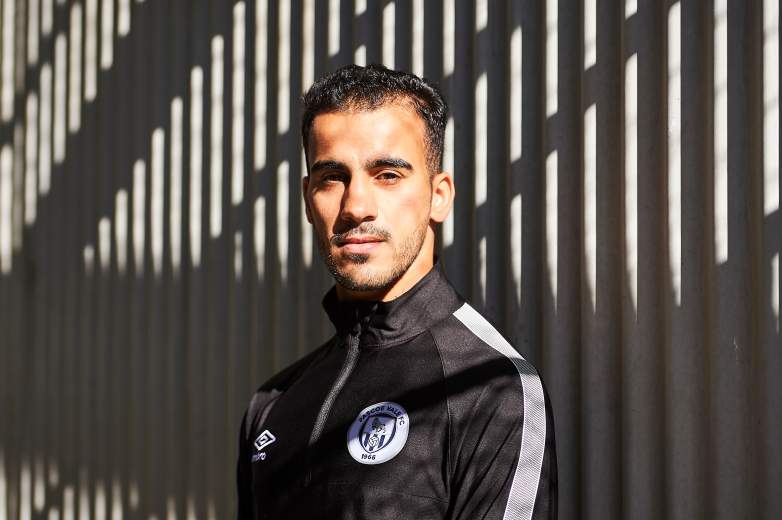
Hakeem al-Araibi returns for Pascoe Vale’s first home match of the season since his release from a Thai prison.
Al-Araibi was arrested in 2012 when he was walking in Bahrain to watch a soccer match, reports The New Arab. Multiple alibis and broadcast footage place Al-Araibi as a competitor in a televised soccer match at the time of his alleged crime.
Al-Araibi was imprisoned for three months in Bahrain.
“They spent three hours hitting me hard on my legs, while saying: ‘we will break your bones, we will destroy your future, you will never play football again with these legs’,” he told German broadcaster ARD.
After his arrest, al-Araibi was granted permission to travel to Qatar for a football match, where he fled to Iran. From Iran he went to Malaysia, Thailand, and eventually Australia where he was granted refugee status. al-Araibi’s brother Emad is imprisoned in Bahrain on the same charge.
4. The Former Defender for Bahrain’s Olympic Team Played Football in Jail
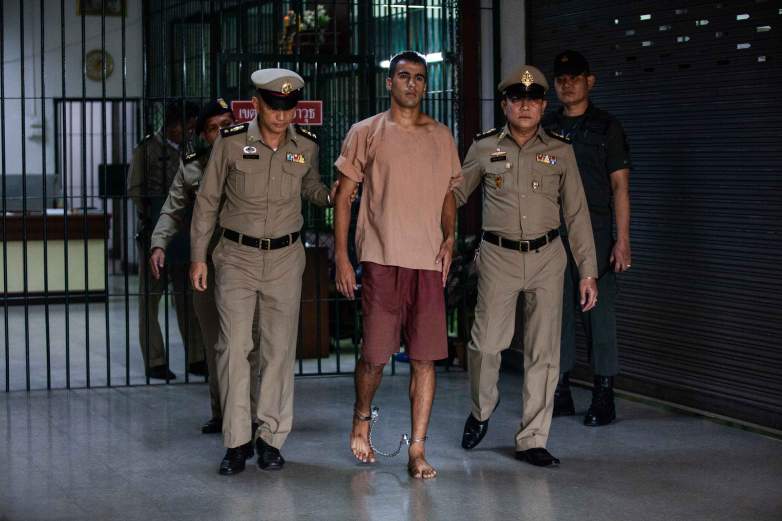
GettyRefugee soccer player Hakeem al-Araibi attends court on February 4, 2019 in Bangkok, Thailand.
Al-Araibi stayed fit while detained by playing football in a small courtyard with other inmates. He hopes to continue his career at Melbourne’s Pascoe Vale Football Club, reports ABC, where he currently plays as a center back.
Al-Araibi was discovered by the Bahrain Football Association when he was 15-years-old. Then, he saw the BFA as a unifying force between the between Bahrain’s Shia and Sunni communities. He played for the Bahrain national football team and the local club Al-Shabab. A Shia club, Al-Shabab ceased activity for nearly a year after the uprising and was then demoted to the second division, reports The Blizzard.
Former Australia national team captain Craig Foster lead the campaign for al-Araibi’s release, and Football Federation Australia chairman Chris Nikou thanked Foster and the Australian, Thai, and Bahraini governments upon al-Araibi’s release reports ABC.
5. His Release Was Considered A Huge Victory for Human Rights
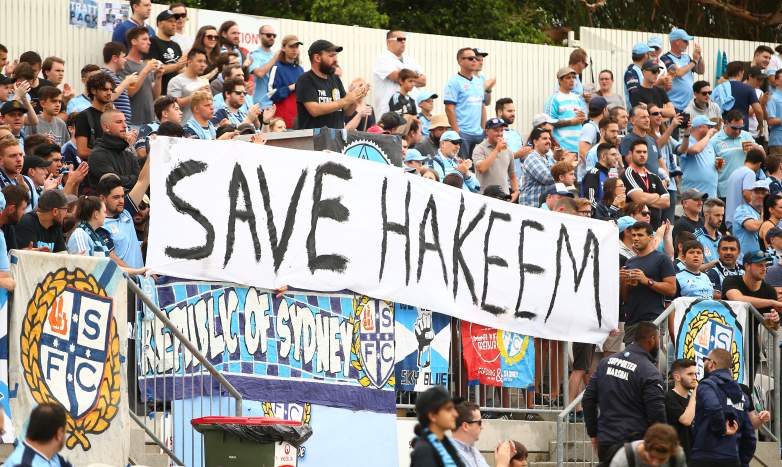
Sydney FC fans display a sign in support for Hakeem al-Araibi on January 19, 2019 in Sydney, Australia.
Al-Araibi spent 76 days imprisoned in Thailand. Human rights activists around the world petitioned his detainment. Members of Pascoe Vale Football Club wrote open letters to Sheikh Salman Bin Ibrahim Al-Khalifa during al-Araibi’s detainment, and collected moe than 50 additional letters, requesting his release. The Australian Football Federation (FFA) canceled a proposed training camp in support of al-Araibi. FIFA released a statement upon his release.
A week before his release, al-Araibi was sentenced to 60 more days in jail. Appearing barefoot and shackled at his hearing, Al-Araibi shouted “Don’t send me to Bahrain” and supporters shouted “Australia is with you” and “Your wife sends her love,” reports The Guardian. A week later, Bahrain withdrew its extradition request. Thailand then released al-Araibi, who returned to Melbourne on February 11, 2019. About 100 supporters greeted him at Melbourne’s Tullamarine Airport. spoke exclusively to Craig Foster immediately following his ordeal.
READ NEXT: Maryland Democrat Uses The N- Word During Conversation With Colleagues: Report